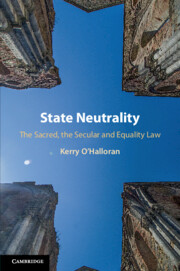Book contents
- State Neutrality
- State Neutrality
- Copyright page
- Dedication
- Contents
- Acknowledgements
- Introduction
- Part I Background
- Part II The Benchmark of State Neutrality
- 4 The United States of America: The Church–State Wall
- 5 Canada: Bijuralism
- 6 England: The Established Church
- 7 France: Laïcité
- 8 Germany: The Vaterland
- 9 Israel: Halakha and Zionism
- Part III Towards a More Stable Civil Society
- Conclusion
- Index
5 - Canada: Bijuralism
from Part II - The Benchmark of State Neutrality
Published online by Cambridge University Press: 15 January 2021
- State Neutrality
- State Neutrality
- Copyright page
- Dedication
- Contents
- Acknowledgements
- Introduction
- Part I Background
- Part II The Benchmark of State Neutrality
- 4 The United States of America: The Church–State Wall
- 5 Canada: Bijuralism
- 6 England: The Established Church
- 7 France: Laïcité
- 8 Germany: The Vaterland
- 9 Israel: Halakha and Zionism
- Part III Towards a More Stable Civil Society
- Conclusion
- Index
Summary
Begins with the church–state relationship, noting the Charter of Rights and Freedoms takes into account the effects of federation, particularly the position of Quebec and the associated complications of laïcité, also addresses the legacy and current impact of bijuralism. Provides an overview of the contemporary relevant legal framework, as governed by statutory and constitutional provisions, noting the extent to which the country is a signatory state to international law. Gives an account of the law relating to the definition of “religion” and “belief”. Examines the church–state relationship as illustrated by case law relating to the freedoms of religion, association and expression. Focuses on the effect of equality and non-discrimination law on the church–state relationship as illustrated by case law. Concludes by considering the nature and extent of jurisdictional congruity with USA as regards their current interpretation of the principle; highlighting distinctive Canadian characteristics; identifying particular principles or rules relied upon by the judiciary or administrative bodies; and assesses the significance of cultural context as a differentiating factor.
Keywords
- Type
- Chapter
- Information
- State NeutralityThe Sacred, the Secular and Equality Law, pp. 201 - 249Publisher: Cambridge University PressPrint publication year: 2021

